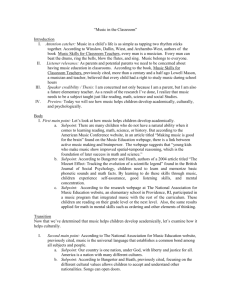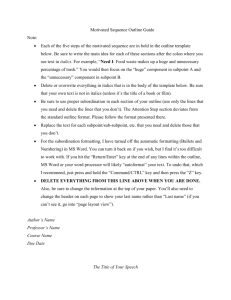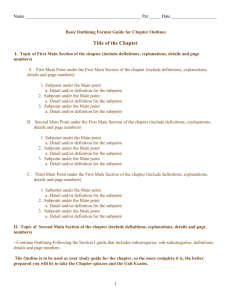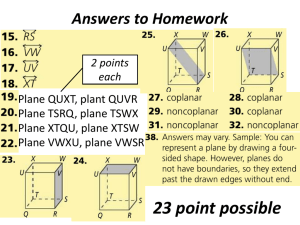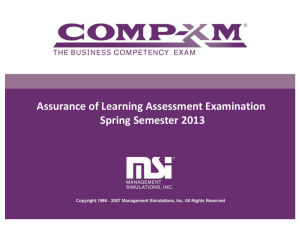Understanding Value Presentation
advertisement
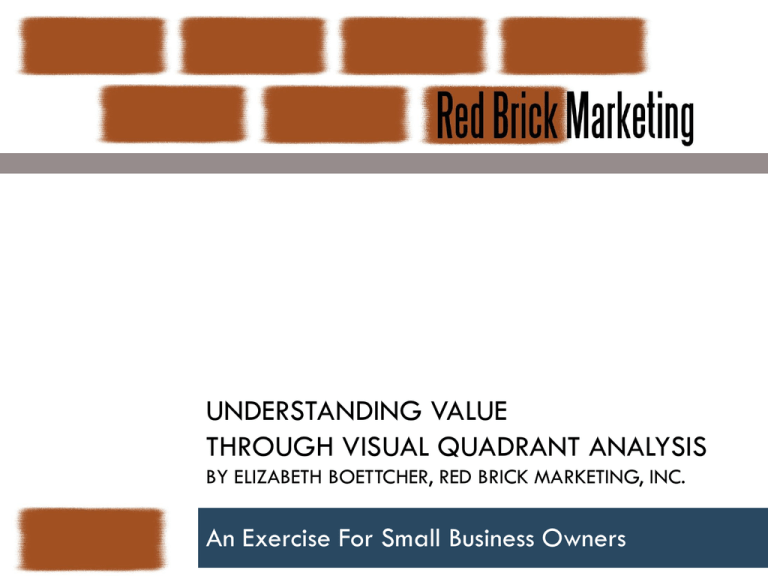
UNDERSTANDING VALUE THROUGH VISUAL QUADRANT ANALYSIS BY ELIZABETH BOETTCHER, RED BRICK MARKETING, INC. An Exercise For Small Business Owners Baseline Definition of Marketing Dr. Philip Kotler answered the question, “What is Marketing?” Marketing is the science and art of exploring, creating, and delivering value to satisfy the needs of a target market at a profit. Marketing identifies unfulfilled needs and desires. It defines, measures and quantifies the size of the identified market and the profit potential. It pinpoints which segments the company is capable of serving best and it designs and promotes the appropriate products and services. Marketing Means Making Choices It is very difficult for small business owners, who have made amazing personal and financial investments, to make choices about messages that they deliver to customers. We want customers to know the whole story all at once. Whether we like it or not, if we don’t make strategic choices about the messages we communicate with our clients, they may never get an understanding of the true value of a small business’s products and services. Marketing and selling your products and services starts by examining the overall strengths, weaknesses, opportunities and threats associated with what you are selling at the price point you have chosen. One tool I have used over and over again throughout my marketing experience is the “Quadrant Value Analysis” power point slide. It forces you to put key information about your value delivery right next to the things that help bring it into perspective. This tool is simple and versatile. When you have organized the key information, it makes it much easier to visually remember where the top priorities are. It can be used as a company / product / service overview, and can make an excellent way to investigate a new segment or think strategically about a specific customer. By E. Boettcher © Red Brick Marketing, Inc. 2011 Simple Tool For Complex Understanding Quadrant Value Analysis Make notes about the the value you deliver to customers by summarizing your most important strengths and weaknesses in a visual comparison. Challenge yourself to think strategically about not only your entire business, but also each segment you serve and several key customers or target customer profiles. Just Fill In The Blanks Getting your business knowledge organized and documented can help prioritize the most important messages you need to communicate with your customers. Keeping the text within the slide’s text box establishes a physical reminder that messages to customers can’t be too long. Make an effort to prioritize your information enough to keep the text within the template. Even if you don’t have a complete marketing plan, you can still get a good idea of what your customers may be thinking when they research their purchase decision. You may need to complete the exercise in a complete document first, and come back to summarize the most important points. Now, delete these intro slides and get started filling your information into the following templates… By E. Boettcher © Red Brick Marketing, Inc. 2011 (Company Name) Value Analysis Company Profile for (Company Name) Company Definition (Describe the purpose of your company, where it operates and who it serves.) (Name the broad industry your company belongs to.) (Describe the way that industry can be divided both by your product and service offerings and the categories of customers (SEGMENTS).) (Further describe your target customer profile. Name some characteristics about the specific types of customers that you serve. List a few key current customers and a few key prospective customers.) Quadrant Value Analysis: Overview Template Strengths Point One (The most important differentiator about your overall company’s offerings) Subpoint A Subpoint B Point Two Point Three Opportunities Point One (The greatest opportunity for you to increase revenue. It may be a new segment, a new client or a new technology.) Subpoint A Subpoint B Point Two Point Three Weaknesses Point One (The biggest reason why you lose business in general.) Subpoint A Subpoint B Point Two Point Three Threats Point One (The most significant competitive dynamic you are currently facing in the marketplace. Different from weaknesses, because these are dynamics outside your own business) Subpoint A Subpoint B Point Two Point Three Template Free for Public Use © Red Brick Marketing, Inc. 2011 Market Segments for: (Company Name) Horizontal Segmentation* Product / Service Category One That Spans Your Entire Customer Base Product / Service Category Two That Spans Your Entire Customer Base * Vertical Segmentation* Group One of customers that can be identified by specific characteristics. Group Two of customers that can be identified by different specific characteristics. You may only need to segment your business in one way or another. You may not need to segment your business at all. However, if you can focus your ideas on your specific targets, and orient your ideas around your customers’ perspectives it is worthwhile. Segment Snapshot Template Segment Specific Strengths Point One (Your most important strength in any segment of your business. This includes any segment or industry specific problems that can be solved by this strength.) Subpoint A Subpoint B Point Two Point Three General Segment Opportunities Point One (Reasons why this segment is strategically important as well as opportunities for business.) Subpoint A Subpoint B Point Two Point Three (One Slide Per Segment) Special Segment Concerns / Weaknesses Point One (Reasons why your product loses out to competition in this segment.) Subpoint A Subpoint B Point Two Point Three Current Segment Ownership Point One (Describe the competitor who has the largest presence in the segment. Who currently owns the market?) Subpoint A Subpoint B Point Two Point Three Template Free for Public Use © Red Brick Marketing, Inc. 2011 Customer Snapshot Strengths: Acknowledged and Unknown Point One (Most Important Products, Services and Differentiators for this customer. Reason why this customer already buys from you.) Subpoint A Subpoint B Point Two (Most important Strengths that the customer has yet to discover about your business.) Weaknesses: Prioritized by Customer Relevance Point One (Only list weaknesses that are relevant to that customer.) Subpoint A Subpoint B Point Two Point Three Point Three Current and Future Opportunities (One Slide Per Customer) Point One (Current Opportunities for Business.) Subpoint A Subpoint B Point Two (General Idea About Potential Opportunities in the Near Future.) Point Three Customer Business Breakdown and Competition Point One (Overview of where competition is earning money from this specific customer.) Subpoint A Subpoint B Point Two Point Three Template Free for Public Use © Red Brick Marketing, Inc. 2011 Conclusions Key Opportunities General Strategy Moving Forward Based on Opportunities Key Messages Segment Opportunity #1 Key Customer Opportunity #1 * Corresponding Overview Message Corresponding Segment Specific Message Corresponding Customer Message Try to prioritize the information you organized in the previous slides and consolidate it down to what is really the most important opportunity and message in each category.

